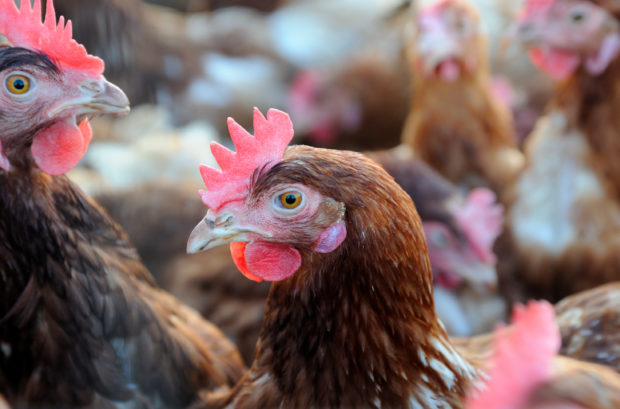
HSI organizes corporate roundtables that bring together food companies and egg and pig producers in different regions, creating a platform for companies to share ideas and leverage their collective influence to improve farm animal welfare. Photo by Getty Images
We’ve taken on factory farming in the United States with decisive results, using a multi-channel approach that includes public education, ballot initiatives, undercover investigations, corporate reform, meat reduction campaigns, and cooperation with farmers and ranchers on our agriculture councils. Humane Society International (HSI) is carrying out a similarly intense and high-impact campaign across the world. The scope of our work is global, and the gains we are making, especially at this early stage in our efforts, are tangible and geographically diverse.
Major food companies around the world are working with HSI to shift production away from lifelong confinement of egg-laying hens in cages. Last week, JBS, the world’s largest meat processing company, announced that it will source eggs exclusively from cage-free hens by 2020, following discussions with HSI and other organizations. Just prior to that, Sapore, the largest Brazilian food service company, which serves approximately one million meals a day, announced a partnership with HSI, to source only cage-free eggs by 2025.
We worked with Kraft Heinz Brazil — which owns the Heinz and Quero brands, and is one of the country’s largest mayonnaise producers — to secure a commitment to a 100-percent cage-free egg supply chain by 2025. Several other mayonnaise brands in Brazil have worked with us on going cage-free. This week, Taco Holding, the second largest restaurant operator in Mexico with more than 550 restaurants across the country, committed to a 100 percent cage-free egg supply chain by 2025, or sooner. The announcement applies to several brands, including Sbarro, Carl’s Jr, and Krispy Kreme.
Colombia’s largest hotel chain, Hoteles Estelar, and a leading Colombian food company, International Meal Company (IMC) Colombia, which operates restaurant chains, have joined with us to announce partnerships to go cage-free by 2022 and 2018, respectively.
In addition to these partnerships, HSI organizes corporate roundtables that bring together food companies and egg and pig producers in different regions, creating a platform for companies to share ideas and leverage their collective influence to improve farm animal welfare. In the past few months, HSI has hosted such events in Mexico, Singapore, and South Africa.
HSI also works closely with local government and non-governmental organizations to move the egg and meat sectors in their countries towards higher welfare farm animal housing systems — an especially important strategy in nations where there are many local, independent food purveyors. With support from the Open Philanthropy Project, HSI has expanded the scope of its work with governments and producers in Southeast Asia, including Indonesia, the fifth largest egg producer and fourth largest broiler chicken producer in the world.
In Vietnam, which holds the fourth largest population of pigs in the world, and where even small farmers with just a few sows confine the animals in gestation crates, HSI is working with universities and local governments to help egg and meat producers transition to higher welfare housing systems for sows and hens. We have already helped Vietnam’s National University of Agriculture transition all sows on their research and training farm out of gestation crates and into group housing systems. We are working with local animal protection organizations in Indonesia, Malaysia, and the Philippines to build public awareness around farm animal welfare issues.
In May, in coordination with the European Bank for Reconstruction and Development, a major international finance institution funding animal agribusiness in Eastern Europe, and the Ukrainian Poultry Association, we invited cage-free egg producers from the United States to talk to egg producers in Ukraine about cage-free production. In July, HSI facilitated a visit from one of the largest egg companies in Argentina to a large-scale cage-free egg facility in the United States.
In India, we have enlisted the help of powerful allies within and outside of government as we continue to work to implement a phase-out of barren battery cages.
HSI is also working with food service institutions, including school districts and universities across the globe, to increase the availability of plant-based options. Last week, after working with HSI, the city of Paulicéia in Brazil officially launched its new Meatless Monday program, serving exclusively plant-based meals to students at all of its public schools every Monday. In South Africa, we have a partnership with the government of the Western Cape Province to increase public awareness about the health and environmental benefits of plant-based foods.
Animals on factory farms don’t care about zip codes, country codes, or languages. They suffer, or thrive, depending upon how they’re treated. It’s our aim to stop their mistreatment and to improve their lot, no matter where they seek sun and soil in the world.
The post Fighting factory farming from Indiana to Indonesia appeared first on A Humane Nation.
Enviroshop is maintained by dedicated NetSys Interactive Inc. owners & employees who generously contribute their time to maintenance & editing, web design, custom programming, & website hosting for Enviroshop.
